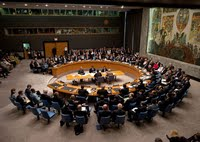NEW DELHI -- The recent U.S.-sponsored United Nations Security Council resolution calling on all nations to sign the Nuclear Non-Proliferation Treaty (NPT) and ratify the Comprehensive Test Ban Treaty (CTBT) has not been well-received in India.
The resolution, adopted last week at a Security Council session led by U.S. President Barack Obama, will ratchet up the pressure on India to sign a document that it considers grossly unfair. In fact India's Special Envoy on Climate Change Shyam Saran conveyed as much to Obama, stating that because the NPT's norms are "discriminatory" and "conflict with India's sovereignty," the treaty is unacceptable to New Delhi.
In an attempt to highlight the gaps in the NPT's current architecture, and to ward off a further heightening of pressure from the U.S. to sign the treaty, Prime Minister Manmohan Singh reiterated India's stance in the Indian Parliament recently. Singh pointed out that the global nonproliferation regime has not succeeded in preventing nuclear proliferation. "Its deficiencies in fact have had an adverse impact on our security," Singh said, adding that to be successful, "global nonproliferation . . . should be universal, comprehensive and non-discriminatory and linked to the goal of complete nuclear disarmament."

